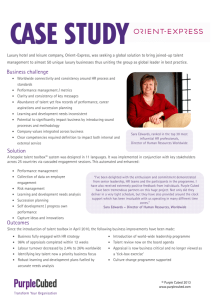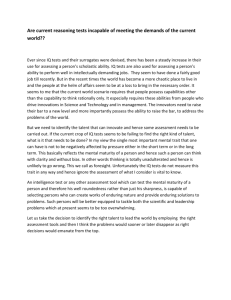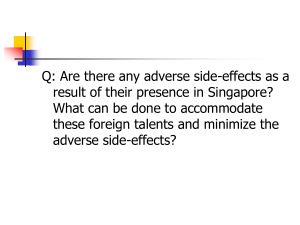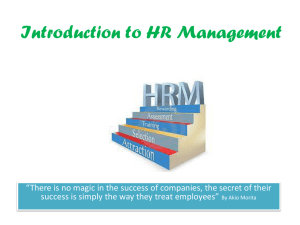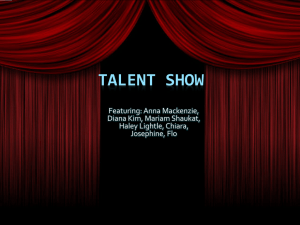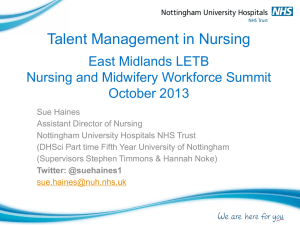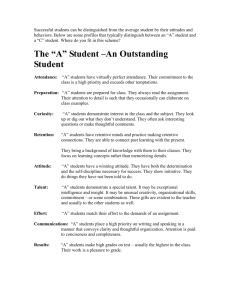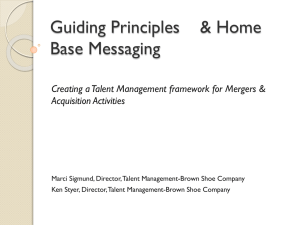Final Project Report - NHS library and knowledge services
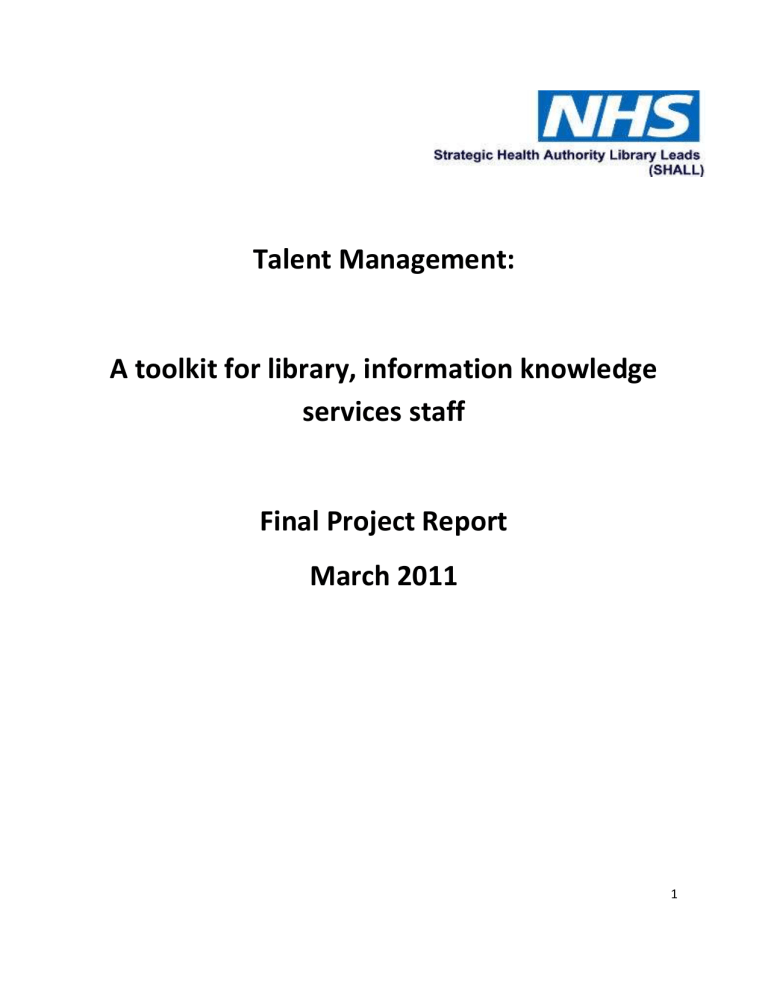
Talent Management:
A toolkit for library, information knowledge services staff
Final Project Report
March 2011
1
Contents
Preface and acknowledgements
Background
Context
What is Talent Management?
Purpose and scope
Talent Management expectations
Using the toolkit
Updating the toolkit
Resources
Appendix: Project plan
7
7
9
7
7
5
6
4
4
Page
3
2
Preface and acknowledgements
This toolkit has been developed from Horizon Scanning work, including events held in South East
Coast and North West Strategic Health Authorities (SHAs). This is a time of significant change in the
NHS and in Library, Information and Knowledge Services staffing, Organisations and staff are not always aware of the range of resources that can help them manage development and change.
The SHA Library Leads (SHALL) Staff Development Group endorsed the ideas behind a Talent
Management project in February 2010, and support for the work was confirmed by the full SHALL Coordinating Group in March 2010.
A Task and Finish Group was formed in April 2010 with the following members:
David Copey South East Coast SHA
John Loy South West SHA
Alison Pope West Midlands SHA
Anne Weist NHS Evidence
Gil Young, North West SHA, joined the Group in September 2010.
This toolkit is the outcome of the work of the Task and Finish Group members, all of whom have contributed significant expertise, contacts and experience to the project.
I would like to thank all the Task and Finish Group members and their contacts and colleagues both within and outside healthcare for the work that has gone into producing what I hope will be a useful resource. It is intended that the toolkit will benefit those thinking about library, information and knowledge services work, and those at various stages in their career within the sector.
David Copsey
Chair, SHALL Staff Development Group
March 2011
3
Background
The SHA Library Leads (SHALL) Staff Development Group established a Task and Finish Group to develop resources for Talent Management in April 2010. This report is the outcome of this work. A Talent
Management toolkit is now accessible through the SHALL website, http://www.libraryservices.nhs.uk/forlibrarystaff/staffdevtandsupport/talentmanagementtoolkit/
Context
Library and Knowledge Services are in a state of transition in all sectors of the profession including academic, public, government and health. For the healthcare workforce, the NHS employers have produced a briefing, Talent for Tough Times: how to identify, attract and retain the talent you need.
1
NHS Library and Knowledge Services have held a number of Horizon Scanning events to aid future planning.
2 A presentation at the 2010 Health Libraries Group Conference shared this activity with a wider audience.
3
Key challenges include -
Succession planning. Many senior staff are nearing retirement. The use of Knowledge Management tools to retain and transfer knowledge is growing 4
Technology. More resources are available as full text on websites, free of charge, through log in authentication, or on payment. Activity statistics demonstrate increased downloading of evidence, but also growth in book loans 5
Demonstrating value for money. Public sector funding is under review in the context of national budget constraints. The NHS White Paper “Equity and Excellence: Liberating the NHS.” 6 Library and
1 NHS Confederation briefing 65, Talent for tough times: how to identify, attract and retain the talent you need, 2009. http://www.nhsemployers.org/Aboutus/Publications/Pages/TalentForToughTimes.aspx
,
November 2009
2 Examples include NHS North West June 2009; NHS South East July 2009
3 Goswami, L and Turner, J Developing the workforce: Horizon scanning: the future for NHS library and knowledge services http://www.cilip.org.uk/get-involved/special-interestgroups/health/events/conferences/pages/conference-2010.aspx#presentations
4 The NHS Institute for Innovation and Improvement, Knowledge Retention and Transfer tool has been integrated into the South East Coast Knowledge Management Module
5 SHALL, Annual NHS library activity statistics
4
Knowledge Services operate within an increasingly tight budgetary framework, and need to justify resourcing, as do all other public sector departments. Recently published tools provide templates for costing NHS library services 7
Impact. Recent work on measuring the impact of Library and Knowledge Services will become increasingly important 8
Experience from other professions suggests that planning processes to identify talent and to establish schemes with clear objectives and outcomes, is a key part of preparing staff for succeeding in a changing work environment. The challenges for NHS library services include clarity about what we mean by talent management; establishing processes, and evaluating their impact; running staff development activities; linking with universities to offer appropriate qualifications; seeking funding to implement proposals. 9
1 What is talent management?
Talent is a difficult concept to define as it can be viewed from a number of perspectives (Leigh, 2009).
10
The Chartered Institute of Personnel & Development (CIPD) defines talent as “those individuals who can make a difference to organisational performance, either through their immediate contribution or in the longer term by demonstrating the highest levels of potential.” 11
Predominantly talent management has focused on career management for the top leaders in response to succession planning for key senior positions within an organisation 12 However in recent years there has been a slight shift with talent management having a greater focus with the need to encompass
6 http://www.dh.gov.uk/en/Publicationsandstatistics/Publications/PublicationsPolicyAndGuidance/DH_1173
53 Department of Health 2010
7 The costing wiki, http://nhscosting.pbworks.com/ brings together this work, access is by invitation
8 See for example, Weightman A, Urquhart C, Spink S, Thomas R. The value and impact of information provided through library services for patient care: developing guidance for best practice. Health
Information and Libraries Journal 2008: 26(1): 63-71.
9 NHS Confederation, op. cit. has several examples in a useful briefing
10 http://www.peoplemanagement.co.uk/pm/sections/misc/search/all-of-peoplemanagement.htm?q=talent%20management
11 CIPD Talent: Strategy, Management, Measurement. Research into Practice. London: Chartered
Institute of Personnel and Development p8.
12 Harrison, R. Learning & Development. 5th Ed., CIPD, London. 2009.
5
senior roles as well as pools for ‘special watch roles’ such as specialist functions, difficult to recruit and retain posts (Devine & Powell, 2008; 13 Taylor, 2005 14 ).
Talent management is about doing something additional or different with those people who are defined as talent for the purpose of the organisation – be it top performers, high potentials, senior managers suitable for director positions, or people suitable for critical roles in the organisation.
15
Talent management can be defined as a set of processes by which businesses identify, attract, develop and retain people with the key skills to further an organisation towards achieving its strategic goal.
It is knowing -
where talent is now and in the future
what skills and experience that talent will need
what talent you currently have, where it is and how good it is
how you can best develop that talent to meet future needs 16
Purpose and scope
The phrase "talent management" usually refers to the activities to attract, develop and retain employees. Library and information services are in a state of transition in all sectors of the profession and experience from other areas suggest that planning processes to identify talent and establishing schemes with clear objectives and outcomes are key elements in preparing staff for succeeding in a changing work environment.
This Talent Management Toolkit is a self-directed learning resource aimed to assist those who wish to implement talent management schemes in their library and information services and need to seek out resources to meet those requirements.
There are five stages of Talent Management
1 Identify
2 Attract
3 Deploy
13 Devine, M. & Powell, M. Talent Management in th e Public Centre, 360° The Ashridge Journal , Autumn
2008, p. 19 – 24 .
14 Taylor, S. People Resourcing, 3rd Ed. CIPD, 2005
15 Hayden, R. M.A. dissertation, unpublished.
16 NHS Confederation op cit
6
4 Develop
5 Retain
Talent Management expectations 17
Creation of new positions
Secondment
Job Shadowing
Support for external promotion
Support for internal promotion
Acting-up
Coaching
Mentoring
Learning and Development opportunities
Using the Toolkit
The toolkit is divided in the stages listed above. Within each section you will find case studies, good practice examples, links to relevant websites and useful resources. You may find it helpful to discuss ideas and implementation plans in your local team meetings or with wider networks e.g. Patch Groups.
Some tools can be used in or as part of an individual’s appraisal/PDP and result recorded in local documentation.
At the end of the toolkit is a pro-forma to help you to gather your thoughts and consider next steps in the implementation process.
Updating the Toolkit
The toolkit will be reviewed annually and content added between annual reviews where this is appropriate. The updating will be managed by the SHALL Staff Development Group. If you have any suggestions for additions or useful resources please contact a member of the SHALL Staff Development
Group.
Links to learning resources are provided in each section. These links are meant as a starting point and are not an exhaustive list.
Resources
The toolkit links to locally created resources, and websites. These are listed and searchable on the Talent
Management section of the SHALL website http://www.libraryservices.nhs.uk/forlibrarystaff/staffdevtandsupport/talentmanagementtoolkit/
The order fits the five stages of Talent Management. -
Support from Professional Bodies
TM Toolkits / TM Systems
17 Hayden, R op.cit
7
Identifying current workforce skills & harvesting knowledge
Generic and library specific qualifications
Shadowing schemes
Leadership development
Vacancy advertising and recruitment surveys
Training Needs Analysis
Career advice, guidance and fairs
Skills assessment & development
Knowledge retention and transfer
Focus groups
Apprenticeships
Influencing skills
Reflective practice
Literature searching
8
Appendix
Project plan
Process / staff involved Timescales
Briefing paper for SHALL Staff February 2010
Development Group (SDG)
Status / issues
Agreement to form Talent
Management Task and Finish (T&F)
Group, members Alison Pope , Anne
Weist , John Loy , David Copsey
Meetings, reporting, project milestones
First conference call / T&F Group
Second conference call
Third conference call
Project plan
23 April 2010
25 May 2010
13 August 2010
19 August 2010
Notes circulated to T&F Group
Actions identified, report to SHALL
SDG
Reports on actions
For comment, endorsement at
SHALL SDG 1 September
Meeting on 2 September Interim Report to SHALL September 2010
T&F membership
Gap analysis
September 2011
Framework for toolkit, resources, October 2010 – March links 2011
October 2010 – March
2011
Gil Young joins T&F group
Fourth conference call 1 February 2011
9
Fifth conference call 7 March 2011
Presentation of toolkit to full Staff 11 March 2011
Development Group
Write report
Final Report to SHALL
March 2011
23 March 2011
Implementation, ongoing review / Summer 2011 on
SDG
10

